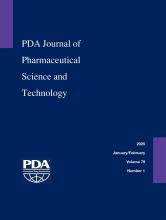Article Information
PubMed
Published By
Print ISSN
Online ISSN
History
- Received May 4, 2018
- Accepted August 9, 2018
- Published online September 19, 2018.
Article Versions
- You are currently viewing a previous version of this article (September 19, 2018 - 09:44).
- View the most recent version of this article
Copyright & Usage
Copyright © 2018, Parenteral Drug Association






